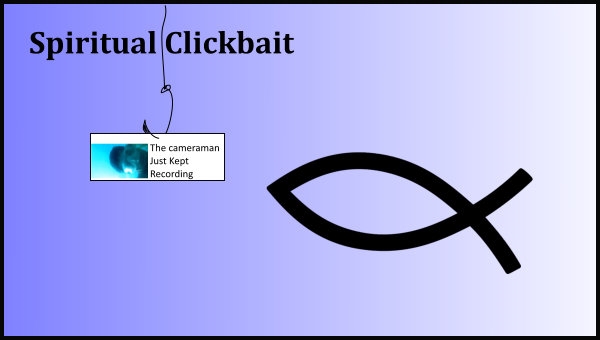By Tyson Thorne

Spend much time on the Internet and you’ll seen them. Usually they are marked as a “sponsored” link and they have enticing headlines like, “29 Rare Photos That Will Leave You Speechless”, or “The cameraman Just Kept Recording” and even “Type in your name - This is Addicting!” It’s called “clickbait” and is intended to get you to a website that contains pretty much nothing but advertisements that will draw you further in. It’s one thing to be tricked on the Internet, but when it’s applied to our spiritual lives its called something else: temptation.
I’m not talking about the day-to-day enticements like an extra scoop of chocolate ice cream, or even the more insidious temptations like adultery, drugs, or stealing from your employer. I’m not even on about the temptations that cause you to fail in living a holy life. I’m talking Garden of Eden temptations, the kind that cause you to question your faith. Have you ever experienced doubt in God? What caused it? That’s what this post is about.
It may be a personal tragedy, a life-ending disease or the death of a loved one. Or maybe it’s living through someone else’s suffering, seeing someone you care about go through a terrible hardship. Perhaps it’s a larger issue, like watching a country in decline, or the plight of Christians across the African continent being persecuted and executed. It may even be an intellectual argument you can’t seem to overcome. Whatever it is, it’s only a jumping off point to the real questions: How do I know that God exists? And if he does, why should I follow him? There are a lot of possible ways to answer the question of God’s existence. Philosophical, intellectual, personal… We’ll take each in turn.
The problem with science is that it can only get us so far. If the object of our study cannot be observed, tested or repeated then science can’t touch it. The origin of the universe is just such an object of study. No one was there to observe it, and it cannot be repeated. For this reason, the question of origins is not a scientific one, it is philosophical (possibly historical). To make a long story short, the best science can offer is that something (maybe energy, maybe matter, or something entirely different) is eternal and is responsible for the creation of the universe and everything in it. You can choose to believe that eternal something is an impersonal force or energy, or you can choose it is a personal supreme being. The design of the universe would argue for the later.
Science is the study of the natural world, not the supernatural. Paul uses it to argue for the existence of God in Romans 1:20: “For since the creation of the world his invisible attributes – his eternal power and divine nature – have been clearly seen, because they are understood through what has been made. So people are without excuse.” A modern example of this argument is found in the design of the planet and solar system we inhabit. You may have heard these statistics before: The Earth is the right size and distance from the sun to sustain life, its moon is the right size and distance to cause the oceans to move and not stagnate or constantly storm, the water that makes up two thirds of the planet’s surface is necessary for live and is a universal solvent making all kinds of life and medicine possible, and the list goes on.
As convincing as philosophy and intellectual arguments can be, they alone rarely move a man to commit to belief in the Creator. There may be someone, someday who develops a better argument against the existence of God we reason, and so faith is not born. Such was not the case for Antony Flew, however. Referred to as one of “the world’s leading atheists” came to believe in God based solely on naturalistic evidences (see the Associated Press article titled “Famous Atheist Now Believes in God” from December 9, 2004 for details). So such arguments have their place, and for this reason Christians should not shun the sciences or naturalist studies.
That said, the very things that cause us to question God’s existence are also often the very things that draw us to him: personal issues. A loved one becomes deathly ill, and we are driven to seek God. The loved one dies and we deny God’s existence. We lose our job and we run to God for a solution, and when we get a new job we focus on the work and not our Rescuer. Tomorrow we’ll examine personal arguments for the existence of God.
|
|